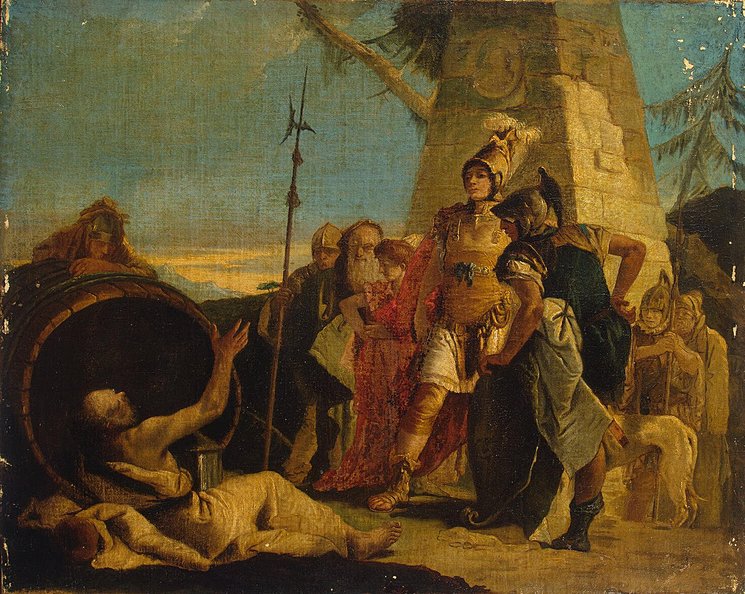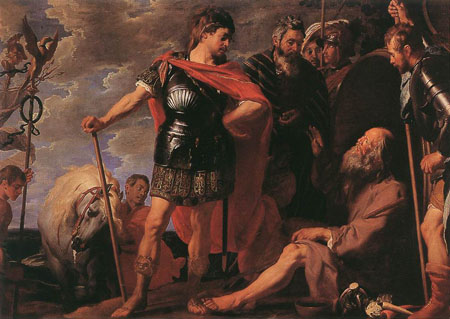Diogenes. And so he lived. Like a dog some said, because he cared nothing for privacy and other human conventions, and because he showed his teeth and barked at those whom he disliked. Now he was lying in the sunlight, as contented as a dog on the warm ground, happier, he himself used to boast, than the Shah of Persia. Although he knew he was going to have an important visitor he would not move.
The little square began to fill with people. Page boys elegantly dressed, spearmen speaking a rough foreign dialect, discreet secretaries, hard-browed officers, suave diplomats, they all gradually formed a circle centered on Diogenes. He looked them over as a sober man looks at a crowd of tottering drunks, and shook his head. He knew who they were. They were the attendants of the conqueror of Greece, the servants of Alexander, the Macedonian king, who was visiting his newly subdued realm.

---Origin: Italy, 1770s, Tiepolo, Giovanni Battista Author of Origin: Tiepolo, Giovanni Battista Personage: Alexander the Great Source of entry: via the State Museum Fund from Yusupov Palace Museum, Leningrad, 1926 School: Venice Theme: History---Read More:http://www.arthermitage.org/Painting/Alexander-the-Great-and-Diogenes.html
Only twenty, Alexander was far older and wiser than his years. Like all Macedonians he loved drinking, but he could usually handle it; and toward women he was nobly restrained and chivalrous. Like all Macedonians he loved fighting; he was a magnificent commander, but he was not merely a military automaton. He could think. At thirteen he had become a pupil of the greatest mind in Greece, Aristotle. No exact record of his schooling survives. It is clear, though, that Aristotle took the passionate, half-barbarous boy and gave him the best of Greek culture.
Aristotle taught Alexander poetry: the young prince slept with the Iliad under his pillow and longed to emulate Achilles, who brought the mighty power of Asia to ruin. He taught him philosophy, im particular, the shapes and uses of political power: a few years later Alexander was to create a supranational empire that was not merely a power system but a vehicle for the exchange of Greek and Middle Eastern cultures.

---Alexander and Diogenes Gaspard de Crayer Our Price: $181.00---Read More:http://www.artclon.com/artist/gaspard-de-crayer/
Aristotle taught him the principles of scientific research: during his invasion of the Persian domains Alexander took with him a large corps of scientists, and shipped hundreds of zoological specimens back to Greece for study. Indeed, it was from Aristotle that Alexander learned to seek out everything strange which might be instructive. Jugglers and stunt artists and virtuosos of the absurd he dismissed with a shrug; but on reaching India he was to spend hours discussing the problems of life and death with naked Hindu mystics, and later to see one demonstrate Yoga self-command by burning himself impassively to death. …
All this life’s preparation was ultimately to meet one man. Diogenes.Would all that expensive schooling help? :
( see link at end) :Diogenes was once asked what he thought of Socrates. “A madman,” he replied.
Later, Plato was asked what he thought of Diogenes. “A Socrates gone mad,” he replied.
Diogenes ridiculed Plato for being long-winded.
Some strangers to Athens once asked Diogenes if he would point out to them the great philosopher [meaning Plato]. Diogenes looked around and then led them to the most deserted part of the city and, gesturing to the empty air as one would in formal introduction, said, “May I present to you the great philosopher Plato.”
Diogenes was once invited to dinner by a wealthy man. During the evening, one of the guests became so outraged by Diogenes’ general behaviour that he began to throw bones at him, calling him a “dog.” Whereupon Diogenes got up, went to the guest, cocked up his leg and urinated on him.
Often when he was begging, Diogenes would be spat on by the people who passed him. Diogenes would ignore this and simply wipe his face with his sleeve. When ridiculed for his passive behaviour, Diogenes said, “Since men endure being wetted by the sea in order to net a mere herring, should I not endure being sprinkled to net my dinner?”
Diogenes stood outside a brothel, shouting, “A beautiful whore is like poisoned honey! A beautiful whore is like poisoned honey! A beautiful whore . . . “. Men entering the house threw him a coin or two to shut him up. Eventually Diogenes had collected enough money and he too went into the brothel. Read More:http://members.optushome.com.au/davidquinn000/Diogenes%20Folder/Diogenes.html







 COMMENTS
COMMENTS



